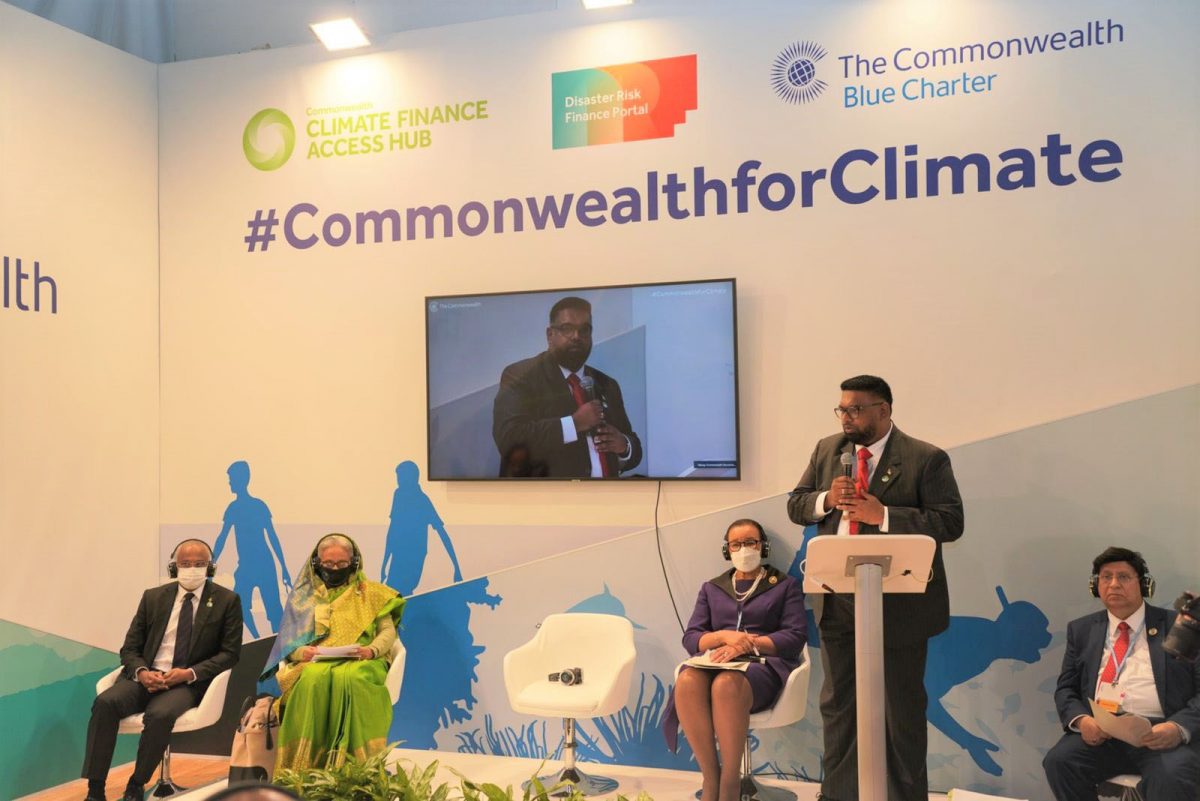Even as he faces local backlash over the non-consultation ahead of Guyana’s participation at the important United Nations Climate Change Conference (COP26), President Irfaan Ali has called for all climate plans to be “comprehensive and inclusive.”
Addressing a high-level discussion at the Climate Vulnerable Forum, a voluntary, non-treaty intergovernmental organisation for vulnerable developing countries, Ali opined that the development of any national, regional or international climate plan must be comprehensive and inclusive.
The event, held in Glasgow, Scotland where the United Nations climate summit is ongoing, was organised by the Commonwealth and chaired by Prime Minister of Bangladesh Sheik Hasina.
A statement from the Office of the President (OP) on Wednesday said Ali emphasised that no plan should assess climate change in isolation of food security, debt security, or national prosperity, since climate change has a negative domino effect on development.
“We are faced with nothing new, but we are to make choices that will decide how well – or if we survive in the future. Climate change affects us all, but unfortunately for Small Island Developing States (SIDS) and Low-lying Coastal Countries, it affects us in a worse way,” he was quoted as saying.
According to OP, Ali also used the opportunity to update the group on Guyana’s Low Carbon Development Strategy (LCDS) and explained that it is a pathway that rests fundamentally on safeguarding the country’s standing forests while creating value and supporting the livelihoods of people through the implementation of development strategies.
Ali told the forum that though it may seem that the declaration on forests, which Guyana is expected to sign on to, may suggest that it is starting from scratch, that is far from the fact. He outlined that work in the area of forest conservation and protection has been going on “forever” and there are countries that have started to implement a series of measures to protect their forests.
“It is something the Commonwealth can also champion in the prosperity plan because the prosperity plan is for us to achieve the targets while not putting people and their livelihoods in an unsustainable framework,” he was quoted as saying.
He added that Guyana is prepared to work with the global community to address the issues of fairness in financing, while pointing out that developed counties ought to play their part in terms of providing financing to vulnerable countries and the climate change agenda.
“We have in the past entered into a carbon credit agreement with the Kingdom of Norway – one of the largest per capita agreements – but what we are seeing is the level of concern for standing forests or forests that are alive is not there, and this is something that we want to champion, and it is something that leads to prosperity,” he said.
Ali’s participation at the summit, which is aimed at getting countries to recommit to significantly cut greenhouse gas emissions in keeping with the Paris Agreement, has come under scrutiny owing to his failure to consult with civil society before entering climate change negotiations.
He made an oral commitment on Tuesday to cut Guyana’s greenhouse gas emissions by 70% in the next nine years.
Deputy Speaker of the National Assembly and leader of the Liberty and Justice Party (LJP) Lenox Shuman, had written to Ali expressing concern over his non-consultation with the Indigenous peoples before participating in COP26.
Internationally, Indigenous peoples are considered as guardians of the forests and frontline environmental activists. Their way of living in harmony with the environment has earned them a voice at the table when discussing climate change and the environment.
Pointing out local laws, Shuman referred the president to the preamble of the Constitution, which makes explicit recognition of the rights of the Indigenous peoples as citizens to land and security and their promulgation of policies for their communities.
“Excellency, in light of the above, it is clear that the state has responsibilities under the various Constitutional clauses and others to ensure that all policies, whether domestic, bilateral or multilateral include the input of the first peoples.
“Further, it becomes difficult to understand under what circumstances and conditions we are to work to protect and preserve our cultures and our environment when the first peoples are not even aware of Guyana’s Intended Nationally Deter-mined Contribution (INDC) which will transition to our NDC. Short of such, it can be viewed as a constitutional shortfall of the state in its responsibilities to the indigenous peoples,” he said in is October 28, 2021 letter to the President.
Additionally, civil society campaigners – A Fair Deal for Guyana – called out President Ali for failing to meaningfully consult with citizens.





